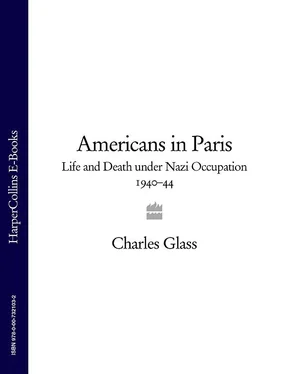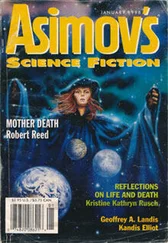Unlike other African-Americans, Josephine Baker was not interned, thanks to her fame in Paris and abroad. An entertainer who had captivated Paris in the 1920s with her topless Danse Sauvage , she was a much-married and much-loved social fixture. Her decision not to abandon France was moral: the Nazis represented an extreme version of the racial hatred she had escaped in the United States. She stayed at her chateau in the country at first and joined the new French Resistance. Her commander was Jacques Abtey, the police officer for whom she had worked spying on Germans in Paris before the war. Miss Baker smuggled documents out of France between the pages of her sheet music and took Resistance leaders disguised as band members to clandestine meetings in Portugal. She made her way to Morocco, where she entertained French and American troops after the North African invasion of November 1942.
The occupation threw up heroes and villains, but more often it produced in the people of Paris a determination to stand fast until the storm passed. In 1940, they did not know who would win the war. They doubted that the United States would give up its cherished neutrality to confront the Nazi menace. Choices were difficult, frequently involving alternatives that were less bad rather than clearly good or evil. When it was all over, the names of the Americans who stayed with their French neighbours for those fifty cruel months are invisibly etched alongside all the others honoured by the monument in the Place Saint-Michel.
PART ONE

14 June 1940
ONE
The American Mayor of Paris
JUST BEFORE MIDNIGHT ON Thursday, 13 June 1940, two men walked out of the American Embassy in Paris into the vast and deserted Place de la Concorde. The French capital’s blacked-out streets presented a strange spectacle to Robert Murphy, the embassy’s counsellor, and naval attaché Commander Roscoe Hillenkoetter. The government, the army and most of the population had abandoned Paris. Two million people, including the vast majority of the 30,000 Americans that Murphy estimated lived in Paris before the war, had fled in fear of the conquering Wehrmacht. Thousands of victorious German soldiers were poised to occupy the undefended city at dawn. American Ambassador William Christian Bullitt, whom the departing French government had effectively appointed mayor of Paris on 12 June, had assured the Wehrmacht’s commanders that Paris was an ‘open city’. Open cities waived their right to resist in exchange for a peaceful occupation. Paris had already given up. Twelve hours earlier, at noon, Robert Murphy barely recognized the previously vibrant avenue des Champs-Elysées: ‘The only living creatures in sight were three abandoned dogs cavorting beneath the large French flags which still hung at each corner of the great concourse.’ On the opposite, Left Bank of the Seine, sheep belonging to refugees from northern France grazed on the Hôpital des Invalides’ ceremonial lawns.
Amid the forlorn expanse of the Place de la Concorde, its Egyptian obelisk swaddled in sandbags and its roundabout eerily devoid of traffic, Murphy and Hillenkoetter watched four spectral figures approach out of the darkness. Murphy recognized Chief Rabbi Julien Weill, religious head of Paris’s Jewish community. With the Grand Rabbin were his wife and two friends. Murphy appreciated their fears. As head consular official for the previous nine years until he became counsellor, Murphy’s responsibility had been the well-being of France’s American community. When the Germans began their rampage through the north of France in May, American citizens demanded embassy protection. At the same time, fourteen million Belgian, Dutch and French men, women and children took to the road ahead of the Nazis. Knowing of German atrocities in Poland during the Blitzkrieg of 1939, Parisians, especially Jews, were understandably fearful. Murphy reflected, ‘We in the embassy felt more sympathy for these victims than we did for a considerable number of Americans who became panic-stricken at the last minute and behaved as if they were particular targets of the Nazis. They had much less reason to become alarmed, since we were not at war.’
Rabbi Weill could have obtained an American visa and gone to New York, where his brother, Professor Felix Weill, taught French and was a United States citizen. Despite Nazi treatment of Jews in Germany and the lands the German Army had occupied since 1938, he had chosen to remain in Paris. Knowing now that the French government itself – including the tough and patriotic Jewish interior minister, Georges Mandel – had fled Paris, the rabbi was reconsidering his decision. Murphy thought that Rabbi Weill had ‘very understandable reasons’ for changing his mind. The rabbi asked Murphy and Hillenkoetter whether he and his family might find places in an embassy car, with its diplomatic immunity, leaving Paris. It was too late, Murphy said. German Panzer divisions surrounded Paris. The exiled American Ambassador to Poland, Anthony Drexel Biddle, Jr, and Embassy Secretary H. Freeman Matthews had departed with the fleeing French government for Tours and were following it on to Bordeaux. No other diplomats were leaving Paris that night. Nonetheless, Murphy lent the rabbi and his family a car whose chauffeur drove them to the city gates. There, German sentries ordered them to return.
The two Americans continued their promenade. No cafés were open, as some usually were at midnight. No light shone from any window or street lamp. The prostitutes had vanished from their usual posts along the rue Saint-Denis and up in Pigalle. The great nighttime gathering places, the markets of Les Halles and the jazz clubs of Montmartre, were closed. Many of the vibrant American ‘Negro’ community, like night club owner Ada ‘Bricktop’ Smith and band leader Benny Carter, had left Paris in the autumn of 1939 or were about to sail on the last America-bound ship from Bordeaux. Even the most celebrated American woman in Paris, 34-year-old chanteuse Josephine Baker, had left – first as a Red Cross nurse aiding the war’s refugees, then for the safety of her country chateau. ‘The few people who remained in the city were buttoned up in their shuttered homes,’ Murphy noted. The only light Murphy could see was arching across the sky north of Paris, each burst of artillery reminding him of a shooting star. Commander Hillenkoetter similarly recalled, ‘Contrary to rumors, the night passed quietly, although artillery firing could be seen and heard in the northwest.’
The night sky was at last clear of a week’s all-pervasive black smoke including that from the burning files of the French government and British Embassy. Most of the conflagration had come from the Standard Oil Company’s petroleum reserves. Standard’s man in Paris, William Dewitt Crampton, had set the stocks alight at the request of the French General Staff only after checking with the American Embassy. Robert Murphy, rather than let a full month’s supply of petrol fuel German tanks, had told Crampton to go ahead.
Murphy, the red-haired Irish Catholic diplomat from Milwaukee, and Hillenkoetter, a 43-year-old Annapolis graduate from St Louis, returned to the rue de Boissy d’Anglas at the northwest corner of the Place de la Concorde. They heard, coming along the Seine from the east, the gigantic bells in the Cathedral of Notre Dame’s spires tolling midnight to herald the new day, 14 June 1940. The embassy’s iron gates, opposite the façade of the now-shuttered Hôtel Crillon in its brooding Palladian majesty, opened to admit Murphy and Hillenkoetter. They entered the chancellery, where, along with Ambassador Bullitt and a skeleton staff, they waited for the German army. Theirs was the last walk anyone took through free Paris.
Читать дальше













